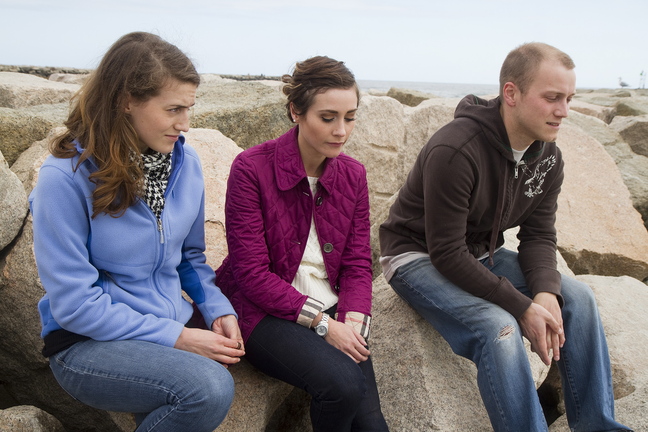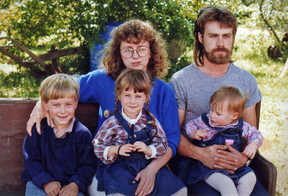WELLS — After their father committed suicide 12 years ago, the teenage Mosher siblings found themselves reeling with grief and a growing sense of isolation.
At 16, Morgan Mosher felt there was no one to talk to about the death of her father, Christopher.
“There were other kids in my school who had lost a parent to a car accident or cancer. This was a different kind of death to deal with,” said Morgan Mosher, now 27 and living in Cambridge, Mass. “You’re the kid whose parent chose to leave. It was isolating.”
Now, Morgan and her siblings – Sydney Mosher and Isaiah Mosher – have teamed up to found Camp Kita, a nonprofit foundation that will host a summer camp for young suicide survivors to meet and heal together. On Sunday they held their first major fundraiser, a memorial kite-flying event at Wells Beach.
It was a big step for the siblings, who rarely shared their stories of being suicide survivors.
“You feel very alone. You don’t think it’s happened at all around you,” said Isaiah Mosher, now 30 and living in Wells with his wife and children. “By bringing people together, they’re aware it happens to others and they’re not alone.”
Each year, 7,000 to 12,000 American children under 18 lose a parent to suicide, according to a 2012 study by the Johns Hopkins Children’s Center.
And that number is almost certainly rising along with a dramatic increase in the number of middle-aged adults committing suicide.
While increasing teen suicide rates have attracted widespread attention, the national suicide rate for adults between the ages of 35 and 64 has quietly increased 28 percent from 1999 to 2010, from 13.7 suicides per 100,000 people in 1999 to 17.6 per 100,000 in 2010, according to the U.S. Centers for Disease Control and Prevention.
Greg Marley, who oversees the Maine Suicide Prevention Program, said Maine reflects that increase. Between 2006 and 2010, the suicide rate among adults ages 35 to 59 increased by 35 percent, he said.
Suicide is the 10th leading cause of death for Mainers, accounting for an average of 180 deaths annually. Four out of every five Mainers who commit suicide are male.
Marley said research shows that unemployment is a significant risk factor for suicide, although research has not established a clear link between unemployment and the increase in suicides. Other factors in recent years may include the economic downturn, change in status as a breadwinner for the family and feeling like a burden, he said.
With the rise in suicide rates, it’s important not only to watch for risk factors and get people help, but also support suicide survivors of all ages, including young children who may grapple with feelings of guilt, Marley said.
“It is shameful and embarrassing and it’s not unusual for people to tend to keep it secret or be discouraged from talking about it,” said Marley, who found out as an adult that his grandfather and great-grandfather died by suicide. “We find that many times people who are grieving the loss of someone close to them by suicide feel more comfortable and better understood when they’re grieving with other suicide survivors.”
Christopher Mosher was 42 and living in Wells when he committed suicide. He was a carpenter and an artist who often photographed and painted beach scenes. He cleared the land and milled the boards he used to build the house in North Berwick where his children grew up.
“He was a free spirit. He hitch-hiked across the country twice,” Morgan Mosher said. He often brought his children on long canoe trips, their boat so loaded with camping equipment it sat perilously low in the water.
Sydney Mosher, 25, was barely 14 when her father committed suicide during her summer vacation.
“I was planning on not having any of my friends know,” she said. “I was going to be normal like it didn’t happen.”
Though some friends and teachers found out and came to the funeral, Sydney Mosher fell into a 12-year-long pattern of not talking about what happened to her father. She still referred to her father in the present tense. It was easier that way.
It’s still hard for Sydney Mosher to talk about her father and how his death changed her life. She would wonder, “What does my dad’s suicide say about me?”
“(Not talking about it) has been my comfort zone for 12 years,” she said. “My heart is racing a mile a minute talking about it now.”
The Mosher siblings rarely talked about their father’s suicide even among themselves. Sydney and Morgan Mosher were still living at home and briefly saw a counselor, but didn’t feel comfortable talking openly about their experience. Isaiah Mosher was living on his own and, like his sisters, avoided the subject.
“It damaged my psyche quite a bit. I wasn’t as outgoing,” he said.
All three have found healing in creating Camp Kita, whose mission is “healing the biggest wounds on the smallest hearts.”
“This is therapeutic for me,” Isaiah Mosher said. “When it happens to you, you feel like you’re the only one. If people know it’s happened to other people and they can talk about it, they won’t feel so isolated.”
That kind of understanding is exactly what Morgan Mosher hopes will come from Camp Kita, which will welcome children for one week next summer at a rented camp in southern Maine. The Moshers are finalizing their nonprofit status with the Internal Revenue Service and plan to sign a lease soon on a camp.
“In a camp setting, a kid may open up more in art therapy or music therapy class,” Morgan Mosher said. “We’re giving kids an opportunity to figure out what works best for them. They’ll feel safe and be with other kids who understand them. When they talk about it, there’s a big weight off their shoulders.”
Across the country, the support for suicide survivors and the identification of the need for support has grown enormously in the past 15 years, said Marley, of the suicide prevention program.
“I think the idea of bringing together young people (at Camp Kita) with adequate support around them is wonderful,” he said. “It can create a place where they can meet and talk and share experiences with other kids their same age. They can make connections and carry that support forward.”
On Sunday, the Moshers hosted their first major fundraiser for Camp Kita at Wells Beach, a place that reminds them of their father. Years ago, Christopher Mosher brought his daughters to the beach after a father-daughter dance to look at the moon shining on the water. With no money for flowers, he instead dedicated the sky to Morgan and the ocean to Sydney.
Averill Dougherty, 31, of Portland arrived early Sunday to decorate a small white kite with a small flower and the quote, “Hope is grief’s best music.” Her father committed suicide when she was 11 and her brother was 9. She said she wishes there had been a place like Camp Kita back then.
Sometimes the family talked about its grief, “but the suicide thing is hard to talk about,” Dougherty said. “Especially when you’re a little kid and you don’t have the words.”
Kristen Gustavsen of York lost her husband, Ralph, to suicide a couple of years ago. Her 10-year-old daughter, Lucy, goes to art therapy and counseling, but Gustavsen said she hopes Lucy will also be able to attend Camp Kita to be around other children who understand her grief.
“It’s amazing how alone you can feel,” Gustavsen said as she watched Lucy try to get her kite up in the air. “You don’t think anyone understands, then you’re with these people who do. It’s a beautiful thing.”
Gillian Graham can be contacted at 791-6315 or at: ggraham@pressherald.com
Send questions/comments to the editors.





Comments are no longer available on this story